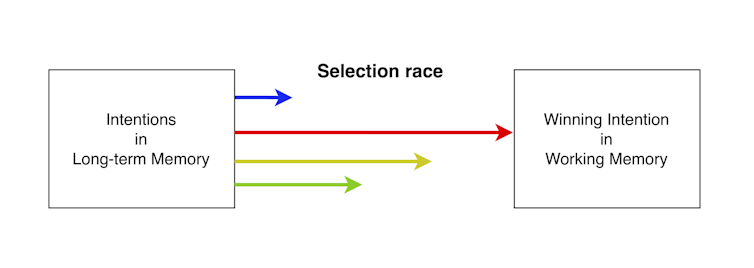Why it isn’t always your fault when you can’t remember

Shutterstock
Thor Grünbaum, University of Copenhagen and Søren Kyllingsbæk, University of Copenhagen
Most of us have experienced the embarrassment of forgetting to do that important thing we promised someone we would do. Sometimes you did everything you could to remember, yet it still slipped your mind.
Our new research could hold the explanation. No matter how hard you try to remember your plans, there is always an element of luck involved.
In the morning you decide to call your old friend in the evening. During the intervening time, you also decide to buy groceries for dinner, pick up the kids from afterschool club and many other things. Psychologists say we can’t keep all these intentions active in our working memory all day. Working memory is the type of memory involved when you maintain some information in your mind to solve problems (like subtracting 377 from 527) or to write down a list of names (when the pen and paper is at the other side of the room).
Working memory is limited, both in its capacity and in the duration of time we can hold information. That’s why people need long-term memory to store their intentions. Long-term memory is a store of information maintained by the brain outside the conscious mind.
The intention race
As we go about our lives, we hold several intentions for the future at the same time. To walk the dog after work, buy a fruit salad for lunch, to take your medicine after dinner, and to call a friend in the evening as promised. We showed in our recent study, that all of these intentions are in a race, competing to get across the finish line in working memory.
We built a mathematical model of how our mind selects an intention to remember. Think of each intention in your long-term memory as individual horses in a race. The speed of an “intention horse” is influenced by how well the intention is matched by the environment and how important the intention is to the person.

An intention to take your yellow pill the moment you have swallowed your last bite of dinner can have a stronger match with the environment (yellow pills and swallowing the last bite) than a plan simply to take your medicine. The importance of an intention is how rewarding it will be for you.
Match and importance influence the speed of the intentions in their race towards selection. This happens subconsciously. The intention pops up for the person, often while they are engaged in some other task.

Shutterstock
But an intention’s strong match with the environment and its high importance do not guarantee it is selected. Even if a task is very important to you and will be very rewarding, there is always a possibility you will forget and perform some irrelevant or less important task. And that means chance is always involved in remembering intentions. The best horse doesn’t always win.
A serious matter
This has moral and legal implications.
In some circumstances, suspects in criminal cases have their freedom restricted. They may be asked to make a daily phone call or attend an appointment at a police station every day, for an extended period of time. Eventually they may forget one of these sessions, which can be taken as a sign that they do not value their legal obligations.
Are we demanding too much of people’s ability to remember their goals? Research has estimated the probability of forgetting an intention is 3%-10%. A study, which asked participants to keep a diary of when they realised they forgot something, calculated that more than half of everyday memory failures are remembering intentions. Many factors can influence the risk of forgetting, such as age, stress, psychiatric conditions, and sleep.
You might be embarrassed by forgetting to do that important thing, but it isn’t always carelessness. The best thing you can do is to think of your intention in detail, give great value to keeping your promise, and set up cues and reminders that help you remember. The rest is up to chance.
Thor Grünbaum, Associate Professor in Philosophy and Psychology, University of Copenhagen and Søren Kyllingsbæk, Professor in Cognitive Psychology at the Department of Psychology and at the Department of Computer Science, University of Copenhagen
This article is republished from The Conversation under a Creative Commons license. Read the original article.








